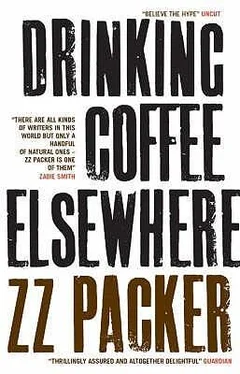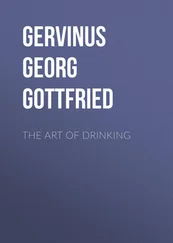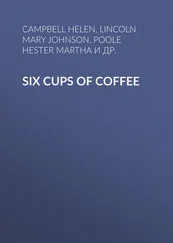I awoke remembering the expression on her face after I’d finished my dizzying whale lecture. She looked like a tourist who’d asked for directions to a place she thought was simple enough to get to only to hear a series of hypothetical turns, alleys, one-way streets. Her response was to nod politely at the perilous elaborateness of it all; to nod and save herself from the knowledge that she would never be able to get where she wanted to go.
THE DISHWASHERS always closed down the dining hall. One night, after everyone else had punched out, Heidi and I took a break, and though I wasn’t a smoker, we set two milk crates upside down on the floor and smoked cigarettes.
The dishwashing machines were off, but steam still rose from them like a jungle mist. Outside in the winter air, students were singing carols in their groomed and tailored singing-group voices. The Whiffenpoofs were back in New Haven after a tour around the world, and I guess their return was a huge deal. Heidi and I craned our necks to watch the year’s first snow through an open window.
“What are you going to do when you’re finished?” Heidi asked. Sexy question marks of smoke drifted up to the windows before vanishing.
“Take a bath.”
She swatted me with her free hand. “No, silly. Three years from now. When you leave Yale.”
“I don’t know. Open up a library. Somewhere where no one comes in for books. A library in a desert.”
She looked at me as though she’d expected this sort of answer and didn’t know why she’d asked in the first place.
“What are you going to do?” I asked her.
“Open up a psych clinic. In a desert. And my only patient will be some wacko who runs a library.”
“Ha,” I said. “Whatever you do, don’t work in a dish room ever again. You’re no good.” I got up from the crate. “C’mon. Let’s hose the place down.”
We put out our cigarettes on the floor, since it was our job to clean it anyway. We held squirt guns in one hand and used the other to douse the floors with the standard-issue, eye-burning cleaning solution. We hosed the dish room, the kitchen, the serving line, sending the water and crud and suds into the drains. Then we hosed them again so the solution wouldn’t eat holes in our shoes as we left. Then I had an idea. I unbuckled my belt.
“What the hell are you doing?” Heidi said.
“Listen, it’s too cold to go outside with our uniforms all wet. We could just take a shower right here. There’s nobody but us.”
“What the fuck, eh?”
I let my pants drop, then took off my shirt and panties. I didn’t wear a bra, since I didn’t have much to fill one. I took off my shoes and hung my clothes on the stepladder.
“You’ve flipped,” Heidi said. “I mean, really, psych-ward flipped.”
I soaped up with the liquid hand soap until I felt as glazed as a ham. “Stand back and spray me.”
“Oh, my God,” she said. I didn’t know whether she was confused or delighted, but she picked up the squirt gun and sprayed me. She was laughing. Then she got too close and the water started to sting.
“God damn it!” I said. “That hurt!”
“I was wondering what it would take to make you say that.”
When all the soap had been rinsed off, I put on my regular clothes and said, “O.K. You’re up next.”
“No way,” she said.
“Yes way.”
She started to take off her uniform shirt, then stopped.
“What?”
“I’m too fat.”
“You goddam right.” She always said she was fat. One time I’d told her that she should shut up about it, that large black women wore their fat like mink coats. “You’re big as a house,” I said now. “Frozen yogurt may be low in calories, but not if you eat five tubs of it. Take your clothes off. I want to get out of here.”
She began taking off her uniform, then stood there, hands cupped over her breasts, crouching at the pubic bone.
“Open up,” I said, “or we’ll never get done.”
Her hands remained where they were. I threw the bottle of liquid soap at her, and she had to catch it, revealing herself as she did.
I turned on the squirt gun, and she stood there, stiff, arms at her side, eyes closed, as though awaiting mummification. I began with the water on low, and she turned around in a full circle, hesitantly, letting the droplets from the spray fall on her as if she were submitting to a death by stoning.
When I increased the water pressure, she slipped and fell on the sudsy floor. She stood up and then slipped again. This time she laughed and remained on the floor, rolling around on it as I sprayed.
I think I began to love Heidi that night in the dish room, but who is to say that I hadn’t begun to love her the first time I met her? I sprayed her and sprayed her, and she turned over and over like a large beautiful dolphin, lolling about in the sun.
HEIDI STARTED sleeping at my place. Sometimes she slept on the floor; sometimes we slept sardinelike, my feet at her head, until she complained that my feet were “taunting” her. When we finally slept head to head, she said, “Much better.” She was so close I could smell her toothpaste. “I like your hair,” she told me, touching it through the darkness. “You should wear it out more often.”
“White people always say that about black people’s hair. The worse it looks, the more they say they like it.”
I’d expected her to disagree, but she kept touching my hair, her hands passing through it till my scalp tingled. When she began to touch the hair around the edge of my face, I felt myself quake. Her fingertips stopped for a moment, as if checking my pulse, then resumed.
“I like how it feels right here. See, mine just starts with the same old texture as the rest of my hair.” She found my hand under the blanket and brought it to her hairline. “See,” she said.
It was dark. As I touched her hair, it seemed as though I could smell it, too. Not a shampoo smell. Something richer, murkier. A bit dead, but sweet, like the decaying wood of a ship. She guided my hand.
“I see,” I said. The record she’d given me was playing in my mind, and I kept trying to shut it off. I could also hear my mother saying that this is what happens when you’ve been around white people: things get weird. So weird I could hear the stylus etching its way into the flat vinyl of the record. “Listen,” I said finally, when the bass and saxes started up. I heard Heidi breathe deeply, but she said nothing.
WE SPENT the winter and some of the spring in my room — never hers — missing tests, listening to music, looking out my window to comment on people who wouldn’t have given us a second thought. We read books related to none of our classes. I got riled up by The Autobiography of Malcolm X and The Chomsky Reader ; Heidi read aloud passages from The Anxiety of Influence . We guiltily read mysteries and Clan of the Cave Bear , then immediately threw them away. Once we looked up from our books at exactly the same moment, as though trapped at a dinner table with nothing to say. A pleasant trap of silence.
THEN ONE weekend I went back to Baltimore and stayed with my father. He asked me how school was going, but besides that, we didn’t talk much. He knew what I thought of him. I stopped by the Enoch Pratt Library, where my favorite librarian, Mrs. Ardelia, cornered me into giving a little talk to the after-school kids, telling them to stay in school. They just looked at me like I was crazy; they were only nine or ten, and it hadn’t even occurred to them to bail.
When I returned to Yale — to a sleepy, tree-scented spring — a group of students were holding what was called “Coming Out Day.” I watched it from my room.
The emcee was the sepia boy who’d given us the invitation months back. His speech was strident but still smooth and peppered with jokes. There was a speech about AIDS, with lots of statistics: nothing that seemed to make “coming out” worth it. Then the women spoke. One girl pronounced herself “out” as casually as if she’d announced the time. Another said nothing at all: she came to the microphone with a woman who began cutting off her waist-length, bleached-blond hair. The woman doing the cutting tossed the shorn hair in every direction as she cut. People were clapping and cheering and catching the locks of hair.
Читать дальше












